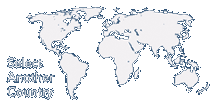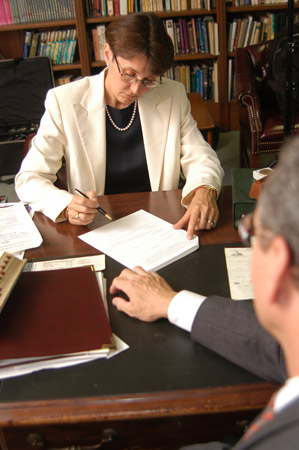This information was devised primarily for the layperson confronted with a private legal problem abroad. It contains general, practical suggestions for dealing with a foreign attorney and information concerning foreign legal aid.
What Type of Lawyer Will You Need?
Barristers and Solicitors
In some countries it may be necessary to retain the services of both a solicitor and a barrister. In such jurisdictions, barristers are allowed to appear in court, including trial courts and higher courts of appeal or other courts. Solicitors are allowed to advise clients and sometimes represent them in the lower courts. Solicitors may also prepare cases for barristers to try in the higher courts.
Notaries, "Notaires," "Notars," and "Huissiers"
In some countries, notaries public, "notaires," "notars," and "huissiers" can perform many of the functions performed by attorneys. In civil law countries, notaries’ education and training differs from that of U.S. notaries public. They frequently draft instruments such as wills and conveyances. In some countries the Ministry of Justice appoints notaries as public officials whose functions include not only preparing documents, but also the administration and settlement of estates. Such notaries serve as repositories for wills and are empowered to serve legal documents. In some countries "huissiers" serve documents. They are not lawyers, but they are very specialized members of the legal profession. They may not plead cases in court. Your foreign attorney may delegate certain functions to a notary, "notaire," "notar," or "huissier."
Choosing an Attorney
When you receive a list of attorneys, contact several of them and briefly describe the nature of the services you desire. Find out the attorney's qualifications and experience. Find out how the attorney plans to represent you. Ask specific questions and expect the attorney to explain legal activities in language that you can comprehend. Do not turn over documents or funds until you are satisfied that the attorney understands your problem and is willing to handle your case. Find out the rules of the foreign country concerning attorney-client confidentiality.
Guidelines on How to Deal with Your Foreign Attorney
Understanding Your Attorney
Ask your attorney to analyze your case, giving you the positive and negative aspects and probable outcome. Do not expect your attorney to give a simple answer to a complex legal question. Be sure that you understand the technical language in any contract or other legal document prepared by your attorney before you sign it.
Fees
Find out what fees the attorney charges and how the attorney expects to be paid. In some countries fees are fixed by local law. Establish a billing schedule that is acceptable to both you and the attorney. Some attorneys may expect to be paid in advance; some may demand payment after each action they take on your behalf and refuse to take further action until they are paid; and some may take the case on a contingency or percentage basis, collecting a pre-arranged percentage of moneys awarded to you by the foreign court. Request an estimate of the total hours and costs of doing the work. Be clear who will be involved in the work and the fees charged by each participant. Determine costs if other attorneys or specialists need to be consulted, such as barristers. Foreign lawyers may be unaccustomed to including a description of work performed in connection with billing. The U.S. Law Library publication “Payment of Attorney” may be helpful (see U.S. section below).
Method of Payment
Find out the expected means of payment (corporate check, bank check, personal check, international money order, wire transfer) and specify currency and exchange rates.
Progress Reports
Ask that your attorney to keep you informed of the progress of your case according to a pre-established schedule. Remember that most foreign courts work rather slowly. You may, therefore, wish the attorney to send you monthly reports informing you of the case’s progress. Ask what the fee will be for progress reports.
Communication
It is your responsibility to keep your attorney informed of any new developments in your case. Be honest and candid. Tell the attorney every relevant fact in order to get the best representation of your interests. Establish a method of communication with your foreign attorney (mail, phone, fax, Internet).
Time
Find out how much time the attorney anticipates the case may take to complete. In some countries the courts recess for a period of several months. In addition, even if the case is resolved, currency control laws may delay the transfer of funds awarded to you for an indefinite period of time. Discuss these issues with your attorney to avoid confusion.
Records
Consider requesting copies of all letters and documents prepared on your behalf. Inquire about the costs of mailing such documents.
Complaints Against Foreign Attorneys
If the services of your foreign attorney prove unsatisfactory, in addition to notifying your embassy or consulate, you may address your complaints to the local foreign bar association. Information about foreign bar associations may be obtained from the embassy or consulate of that country.
If the Attorney Is Not Fluent in Your Language
If the attorney does not speak or write in your language, you can arrange for translation of correspondence.
Document Translation
If you need to provide complex or technical documents to your attorney, you may wish to consider having the documents translated into the attorney's native language. Remember that even a fundamental knowledge of your language may not be enough to enable the attorney to understand technical documents you provide.
Authentication
Authentication of documents is done by the embassy or consulate and is an official statement that the document is authentic. It may be helpful to provide foreign authorities or your attorney with authenticated, translated copies of pertinent documents. Consult your attorney before going to this expense.
U.S. Citizens Seeking an Attorney
Disclaimer: This information is provided by the U.S. Department of State for general information only. The Department of State makes no warranty regarding the accuracy of this information. While some of the information is about legal issues, it is not legal advice. Questions involving interpretation of specific foreign laws should be addressed to foreign attorneys.
Publication on Payment of Attorneys
The U.S. Library of Congress Law Library publishes a document titled "Payment of Attorneys and Litigation Expenses in Selected Foreign Nations," Doc. LL-95-2 (March 1995). This publication includes information on Australia, Canada, China, France, Germany, Great Britain, Greece, India, Italy, Japan, Mexico, Netherlands, Poland, Sweden and Taiwan.
Proviso
Officers of the Department of State and U.S. embassies and consulates abroad are prohibited by federal regulation from acting as agents, attorneys, or in a fiduciary capacity on behalf of U.S. citizens in private legal disputes abroad.
Recommendations
Code of Federal Regulations (CFR) provides that Foreign Service officers shall refrain from recommending a particular foreign attorney, but may furnish names of several attorneys or refer inquiries to foreign law directories, bar associations, or other organizations.
Foreign Legal Consultants: These are U.S. law firms with offices in foreign countries. They may or may not be licensed to practice law abroad. For a list of foreign attorneys, visit www.passportsusa.com/law/info/judicial/judicial_2519.html.
Contact: CA/OCS/ACS
Room 4811A, 2201 C Street N.W.
Washington, D.C. 20520
Tel: [1] (202) 647-5225 or 5226
Please send a stamped, self-addressed 8½ x 11 envelope, with postage to accommodate 20 sheets of paper or more. These lists of attorneys are also being added to the Internet home pages of our U.S. embassies and consulates. American attorneys licensed to practice in the foreign country, or working as foreign legal consultants, are included. Local foreign bar associations are used as a resource in determining whether an attorney is in good standing.
Law Directories
Disclaimer: The Department of State assumes no responsibility for the professional ability or integrity of the firms or persons whose names appear in the attached list. The order in which they appear has no significance.
Martindale-Hubbell Law Directory
Tel: [1] (800) 526-4902
on-line via Lexis
Campbell's List
A Directory of Selected Lawyers
Tel: [1] (407) 644-8298
Russell Law List
Legal Correspondents International
Tel: [1] (410) 820-4475
The American Lawyer
Practice Directories
Tel: [1] (212) 973-2800
American Bar Association
While the ABA does not provide international referrals, it can provide the names and addresses of national or local bar associations as well as the names of several reference guides. Contact:
E-mail: [email protected]
Tel: [1] (312) 988-5107
Legal Aid
There may be facilities in the foreign country for low cost or free legal services. If information is not included in the consular list of attorneys, ask the local foreign bar association or ministry of justice about the availability of legal aid. Legal aid information may also be available from a local branch of the International Social Service (ISS). The agency’s headquarters are in Geneva, Switzerland.
ABA Standing Committee on Lawyer Referral and Information Service
www.abanet.org/legalservices/lris/
ABA Division for Legal Services: Access to Justice
www.abanet.org/legalservices/
ABA Standing Committee on Legal Aid and Indigent Defendants
www.abanet.org/legalservices/sclaid/
ABA Resources on Legal Services for the Poor
www.abanet.org/legalservices/findlegalhelp/faq_freehelp.cfm
ABA Center for Pro Bono
Hotline: [1] (312) 988-5769
www.abanet.org/legalservices/probono/
EU/EEA Countries: (Austria, Belgium, Denmark, Finland, France, Germany, Greece, Iceland, Ireland, Italy, Luxembourg, The Netherlands, Norway, Portugal, Spain, Sweden, United Kingdom)
ec.europa.eu/dgs/legal_service/index_en.htm
Bar Associations
American Bar Association
750 N. Lake Shore Drive
Chicago, IL 60611
Tel: [1] (312) 988-5000
American Society of International Law
2223 Massachusetts Avenue, N.W.
Washington, D.C. 20008
Tel: [1] (202) 939-6000
Fax: [1] (202) 797-7133
Inter-American Bar Association (IABA)
1211 Connecticut Avenue, N.W., Suite 202
Washington, D.C. 20036
Tel: [1] (202) 393-1217
Fax: [1] (202) 393-1241
International Bar Association (IBA)
2 Harewood Place, Hanover Square
London, WIR9HB, England
Tel: (011) (44) (171) 629-1206
Fax: (011) (44) (171) 409-0-456
Inter-Pacific Bar Association (IPBA)
Nashiazabu Sonic Building
3-2-12 Nichiazabu,
Minato-Ku, Tokyo, 106, Japan
Tel: (011) (81) (3) 34085079
Fax: (011) (81) (3) 334085505
Law Association for Asia and the Pacific
33 Barrack Street, 3rd Floor
Perth, W.A., 6000, Australia
Tel: (011) (61) (9) 221-5914
Union Internationale des Avocats (UIA)
25 Rue de Jour
Paris, France, 75001
Tel: (011) (33) (1) 4508-8231
Fax: (011) (33) (1) 4508-8231
World Jurist Association
1000 Connecticut Avenue, N.W.
Suite 202, Washington, D.C. 20036
Tel: [1] (202) 466-5428
Fax: [1] (202) 452-8540
Additional Information: The Office of American Citizens Services has general information flyers on international judicial assistance. Many of these flyers are available on the Internet via the Department of State, Bureau of Consular Affairs, Judicial Assistance section attravel.state.gov. See also the Department of State, Office of the Legal Adviser for Private International Law home page for information regarding private international law unification at www.state.gov/s/l/c3452.htm.
Questions: Additional questions may be addressed to the U.S. Department of State, Bureau of Consular Affairs, Office of American Citizens Services, [1] (202) 647-5225 or [1] 202-647-5226.
Copyright © 1993-2025 World Trade Press. All rights reserved.


